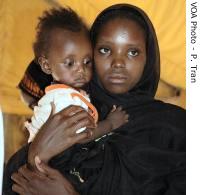2007年VOA标准英语-Displaced Chadians Wait for Return to Burnt Vil(在线收听)
Bandala, Chad
18 May 2007
Over the past year in eastern Chad, dozens of communities have fled fighting between rebel groups and Janjaweed militias based in Sudan. The scorched landscape along the remote far east, along the border with Sudan, is now mostly empty after thousands of Chadians fled the constant border attacks and pillaging. Phuong Tran talked to villagers from Bandala who escaped their burning homes six months ago and are now waiting to return safely.
At a temporary camp in Habile, 85 kilometers from Chad's border with Sudan, sisters Adama and Fatouma talk about returning home, but they say they are afraid they may not be able to recognize it when they get there.
Adama, the younger sister, says she remembers the mango, guava and tamarind trees around their house, but knows they are no longer there.
Her older sister Fatouma, a mother of seven, says when suspected Janjaweed militia attacked and burned their village of about 700 people, the fighters took even the fruits from the earth. The sisters say they lost their mother in the attacks, and that they will not go back for now, because of the Janjaweed.
 |
| Sudanese mother and child, Habile, Chad, 14 May 2007 |
Djima Barka Kamis has been the village chief of Bandala since 1963. The 60-year-old chief described what he remembers from six months ago.
"The Janjaweed attacked from east to west with their weapons," he said. "How could we have protected our village with only our bare hands? And we are still not safe here. They came after us here four months ago."
At the end of last year, fighting among different armed groups partially burned down Habile, where this camp is located.
Chief Kamis says no one at the camp feels safe.
"Even here, we are still not safe," he said. "Women are not able to leave this area because they can be raped."
Humanitarian agencies have asked the international community to help improve border security, especially after Chad's army cut back its forces along the border early last year.
The army was fighting a Chad rebel movement elsewhere in the east that is seeking to overthrow the current government.
The reduction in troops has left huge patches of the 1,000-kilometer-long border between Chad and Sudan unprotected.
The United Nations is negotiating with the Sudanese and Chadian governments to post international peacekeepers along the border.
The camp in Habile, where the sisters have sought safety, is just kilometers from Bandala, their home village. Bandala is mostly silent now, except for the desert wind. The fruit trees are gone. Only piles of burnt branches, burnt and broken clay pots, and empty wrappers remain.